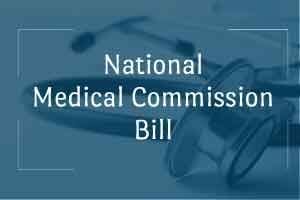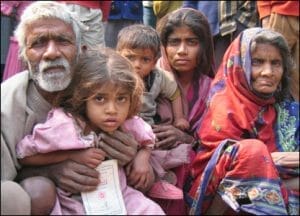
Dr Mansoor Ali
A provision in the National Medical Commission Bill has made differences of opinion and disagreements among the doctors across the country.
Doctors across India including Central Council of Homoeopathy are strongly opposing a provision in the National Medical Commission Bill, tabled in the parliament last week, that seeks to let homeopathy and other AYUSH practitioners practice modern medicine through a short term course.
IMA said “Govt promoting legalised quackery by permitting Ayush doctors to practice allopathy through a bridge course”
The main beneficiaries
- Allopathy pharmaceuticals will get more revenue
- Private Ayush medical colleges across India – they will get more student admissions – since this is a legalised short cut to practice allopathy. Many of the Homoeopathy colleges in Maharashtra are now equipped with ‘allopathy’ facilities – after the introduction of short term pharmacology course by MUHS.
- The rural and tribal people – they will get integrated treatment instead of quackery – In remote regions and villages where there is no MBBS trained doctor in sight for hundreds of kilometers at a stretch, thousands of AYUSH practitioners help dispense basic medical services and even help save lives.
- Half cooked/improperly trained Ayush doctors
Why Govt forced for this decision?
Allopathic doctors are not willing to work in rural and tribal areas- immediately after MBBS, they are concentrating on PG preparation for many years.
A few studies done in the past have in fact have shown that registered medical practitioner or AYUSH doctors have helped provide medical care in remote areas as MBBS doctors prefer urban postings.
A study carried out by New Delhi based public health research institute, Public Health Foundation of India in 2014, had highlighted that in as many as 32 per cent of primary health centers are in remote and tribal areas, it is the alternative medicine practitioners who carry out clinical care.
While the WHO mandates a doctor-patient ratio of 1:1000, in India it is as low as 1:1674.

Eight per cent of the PHCs across rural India are running without a doctor. Primary health care deals with basic medicine, treatment of minor ailments, immunization, child healthcare as well as natal and postnatal care. With little or no presence of private hospitals in rural areas, this leaves a large section of the rural population effectively without access to a doctor.
In such circumstances, training AYUSH practitioners to fill the gaps in healthcare delivery at primary level can improve the doctor-patient ratio and provide the poorest masses in remote areas some medical assistance.
After all Ayush doctors also pursue five-year courses in other forms of medicine and study physiology and anatomy like MBBS doctors. if doctors from other streams are given basic training in modern medicine and are permitted to work at primary level that is beneficial to people residing in rural and difficult rural areas.
“Allowing AYUSH practitioners to legally take up integrated practice will not only help in curbing quackery but also ensure that people in rural areas get timely treatment. Following the shortage of doctors and specialists, most people in rural areas do not have access to quality healthcare. They end up visiting quacks which is even more dangerous. Also several primary health centres in remote areas are still run by AYUSH practitioners.They know the pulse of the people seeking their services,” Karnataka Health and Family Welfare Minister U.T. Khader.
Unless and until trained doctors are made available, millions of people will continue to flock to these practitioners anyway in desperate need of medical help. In such a situation, training these practitioners in providing the right care for minor diseases and identifying and referring serious conditions to specialists seems a viable solution in the short term
Why Central Council of Homoeopathy and many homeopaths opposing?
This permission of the government to practice allopathy by homoeopaths has made differences of opinion and disagreements among the homoeopathy community in the country as a section of them especially from Maharashtra, Madhya Pradesh etc. have welcomed the government decision, but several of them not supporting it by contending that it will lower the dignity of the system.
“Though the decision is to extend the reach of medical aid to deserving common public in rural areas, in the long run, it will only help in degradation of homoeopathic system of medicine as well as substandard medical services to the public” – said IHMA( Indian Homoeopathy Medical Association) in a press release.
According to them study one system and practice another system is unethical. If homoeopaths practice allopathy, the medical profession of homoeopathy will gradually become less popular and it will lose its charm.

All AYUSH doctors study their respective papers along with modern anatomy pathology surgery social n preventive medicine etc in detail. except biochemistry every thing they study. Ayurveda docs study even sanskrit and eastern philosophy too. If there is a bridge course to equip them with modern knowledge also, then why not ?Ayush docs can then effectively become the backbone of Indian health sector where rural health care can be secured more effectively .
May be Dr Mansoor Ali is in favour of cross pathy. Because, described pros and cons are scribbled casually. Enough analysis should have been done with serious application of mind before such presentation on an important issue. Decision makers are to be made aware of possible misuse arising out of cross pathy. Should have followed the FB posts to get additional information.
He is not in favor
I am the one against Bridge Course in Allopathy for AYUSH Doctors. I shall focus on Homoeopathy alone, and not the other AYUSH Systems. It would be a death nail for Homoeopathy if allowed so. The concern of the Government are genuine, but the better method is to give more confidence to Homoeopaths in their own system. The focus should be to train them handle most conditions with their own medicines. The Literature like Ruddock’s Vade Mecum, Therapeutics by K. C. Bhanja, Pointers by Tyler, Biochemic System of Medicine shall be much more helpful to achieve the desired objective.
Allopathic is allowed at primarily leval
It should be helpful to.entire community.
Whatever arguments , discussion & deliberations may be, it is not at all good decision to allow any particular system of treatments to practice another system of treatments. Example Allopaths practicing Homeopathy or Ayurveda, similarly Ayush Doctors practicing Allopathy with half knowledge is not at all advisable. specialisation will have no meaning and ad-mixture of allopathic medicines with natural medicines and vice-versa will loose its fundamental principles. AYUSH treatments are God Given gift to Mankind, Modern system of treatments are manmade, which has limitation.
only vested interested people may be trying to destroy ancient system.